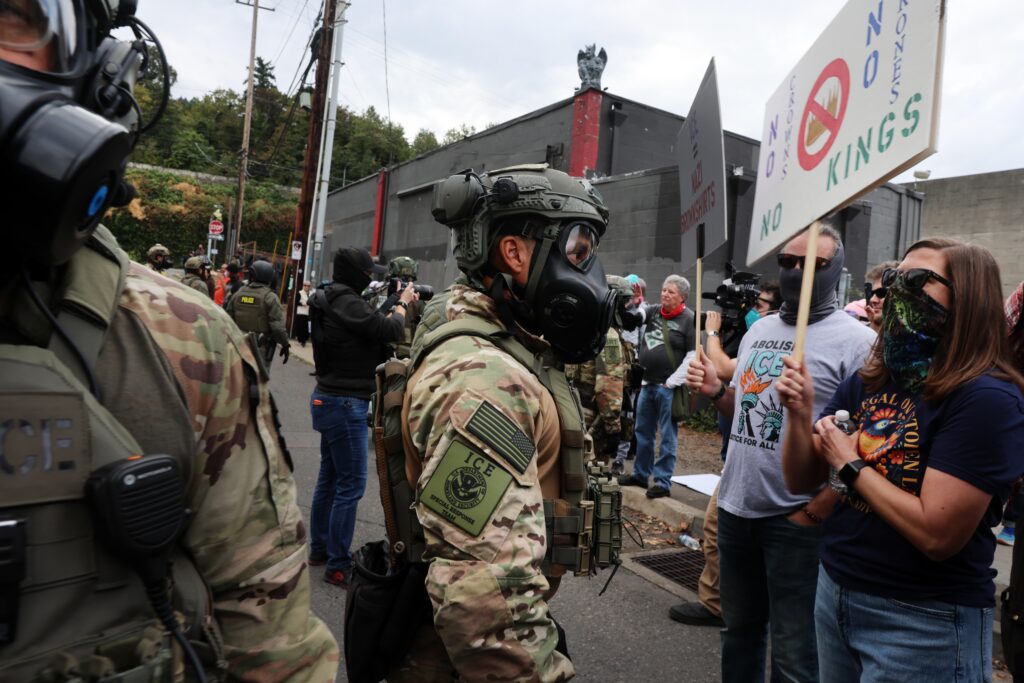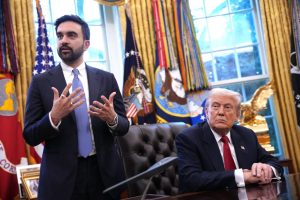Federal agents, including members of the Department of Homeland Security, the Border Patrol, and police, attempt to keep protesters back outside a downtown U.S. Immigration and Customs Enforcement facility on Oct. 4, 2025 in Portland, Oregon. (Photo by Spencer Platt/Getty Images)
WASHINGTON — The White House slammed a President Donald Trump-appointed federal judge Monday for blocking the deployment of National Guard troops to Oregon, as hostilities escalate between the administration and Democratic states where Trump has begun sending in troops over governors’ objections.
White House press secretary Karoline Leavitt said the Trump administration is within legal bounds and will appeal the district court’s decision, which she described as “untethered in reality and in the law.”
“The president is using his authority as commander in chief, U.S. Code 12406, which clearly states that the president has the right to call up the National Guard in cases where he deems it’s appropriate,” Leavitt said at the press briefing, referring to a section in Title 10 of the U.S. Code that authorizes the president to send in the National Guard in cases of invasion or rebellion.
Leavitt told reporters that a U.S. Immigration and Customs Enforcement, or ICE, facility in Portland where nightly protests have been occurring has been “under siege” by “anarchists.”
“They have been disrespecting law enforcement. They’ve been inciting violence,” Leavitt said.
Mainstream local media reports and statements from local officials have contradicted that claim.
”There is no need for military intervention in Oregon. There is no insurrection in Portland. No threat to national security,” Oregon Gov. Tina Kotek, a Democrat, said in a statement Sunday.
Federal agents used tear gas and pepper balls on nonviolent protesters Saturday evening, according to local media reports.
Illinois Gov. JB Pritzker also filed a legal challenge against the administration Monday morning. A federal judge set a hearing for Thursday. Illinois and Chicago sought a temporary restraining order to stop Trump and Defense Secretary Pete Hegseth from ordering Texas and Illinois Guard troops to the country’s third-largest city.
Trump teases Insurrection Act
Trump on Monday afternoon raised the possibility of invoking the Insurrection Act of 1807, a tool to expand the president’s legal authority for using military personnel for domestic law enforcement.
Asked by a reporter in the Oval Office the conditions under which he would invoke the law, Trump said “if it was necessary,” and speculated that he could use it to defy courts or state officials.
“So far it hasn’t been necessary,” he said. “But we have an Insurrection Act for a reason. If I had to enact it, I’d do that. If people were getting killed and courts were holding us up or governors or mayors were holding us up, sure, I’d do that. I want to make sure that people aren’t killed. We have to make sure our cities are safe.”
Court battle in Portland
In Oregon, federal District Judge Karin Immergut broadened her order Sunday night barring the Trump administration from deploying any National Guard troops to Portland.
The edict came after Trump and Hegseth defied a temporary restraining order that Immergut issued Saturday halting 200 Oregon National Guard troops from being sent there.
Immergut was nominated by Trump in 2019 and confirmed by the U.S. Senate by voice vote.
The administration maintains the Guard is needed to protect federal agents, as sustained small protests pop up outside an ICE facility 2 miles south of city hall. Kotek rebuffed Trump’s claims that the city is “on fire” and said local authorities are equipped to handle the demonstrations that lately range from a dozen or so people to roughly 100.
Trump ordered 101 California National Guard troops to Portland overnight, without the knowledge of Kotek, she said Sunday. California Gov. Gavin Newsom, a fellow Democrat, confirmed that Trump had ordered up to 300 of his state’s National Guard troops to Oregon.
Just before Immergut’s Sunday night emergency hearing, an Oregon assistant attorney general filed a memo with the court showing that Hegseth had ordered 400 Texas National Guard troops to Portland and Chicago.
California joined Oregon and Portland in suing the administration.
‘A domestic militarization’
Pritzker said he has urged Texas Gov. Greg Abbott to “immediately withdraw his support for this decision and refuse to allow Texas National Guard members to be used in this way.”
“Let me be clear, Donald Trump is using our service members as political props and as pawns in his illegal effort to militarize our nation’s cities,” Pritzker said at a press conference Monday afternoon.
Illinois Attorney General Kwame Raoul said the deployment “is unfair to National Guardsmen, it is unfair to local law enforcement, and it is certainly unfair to the law-abiding citizens of Illinois who do not want to be subject to military occupation.”
Chicago is nearly a month into a federal immigration crackdown. Dozens of federal agents raided an apartment building in the city’s South Shore neighborhood on Sept. 30, ziptying adults and children, and detaining some U.S. citizens, according to multiple media reports. The U.S. Department of Homeland Security published a highly produced video of the raid on social media.
Trump’s federalization and deployment of National Guard troops to mostly Democratic-run states has alarmed political and constitutional experts.
Pat Eddington, senior fellow in homeland and civil liberties at the libertarian Cato Institute, said he agrees with Pritzker’s concerns.
“I share his belief 100% that the use of the American military and all these massive employment of ICE and HSI and FBI and marshals and the rest for ostensible immigration enforcement and ostensible crime control, it’s really designed to lay the groundwork to normalize a militarization, essentially a domestic militarization of Americans, civic life,” Eddington told States Newsroom in an interview in late September.
On a Monday afternoon press call, Hima Shansi, the head of the American Civil Liberties Union’s national security program, said Trump’s use of military and federal police forces in recent months “raises serious constitutional concerns in terms of federalism, the separation of powers between the federal government and the states which generally exercise police power.”
“What that means in real-people language is that, as the states have been saying, they are fully capable of doing their jobs as needed, and there is absolutely no reason for the president to assert federal power in the way that he is forcibly doing.”
Starting in Los Angeles
Trump federalized California National Guard troops and deployed U.S. Marines to Los Angeles in June in response to protests against aggressive immigration enforcement there.
Newsom objected to the plan and sued to stop the deployment. A federal judge initially sided with the Democratic governor and blocked the deployment, but an appeals panel reversed the decision.
The trial court ruled again in September that Trump had overstepped the line separating military forces from law enforcement. The administration has appealed.
While that case in California was ongoing, Trump also ordered the District of Columbia National Guard to assist local police in the nation’s capital. Because the district is a federal territory, it is relatively clear that move was within the president’s legal authority, even if many Trump critics questioned its necessity.
National Guard troops from several Republican states also deployed to the district in a more legally dubious move.
Trump also ordered Tennessee National Guard troops to Memphis last month, with the approval of the state’s Republican governor.
Ashley Murray reported from Washington, D.C. Jacob Fischler reported from Portland, Oregon.





